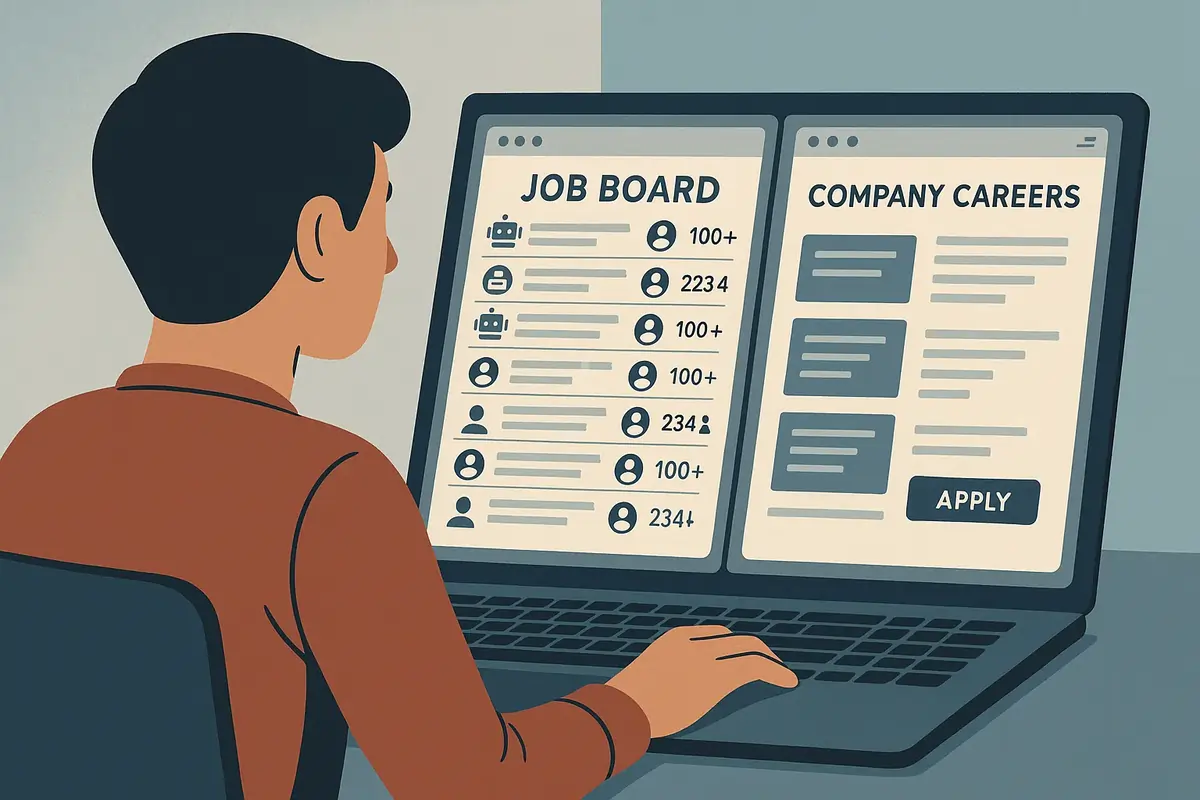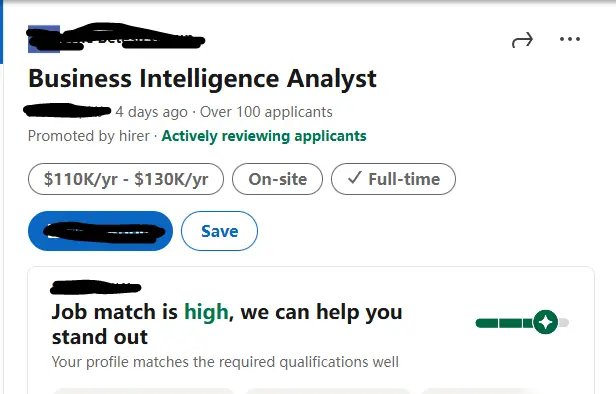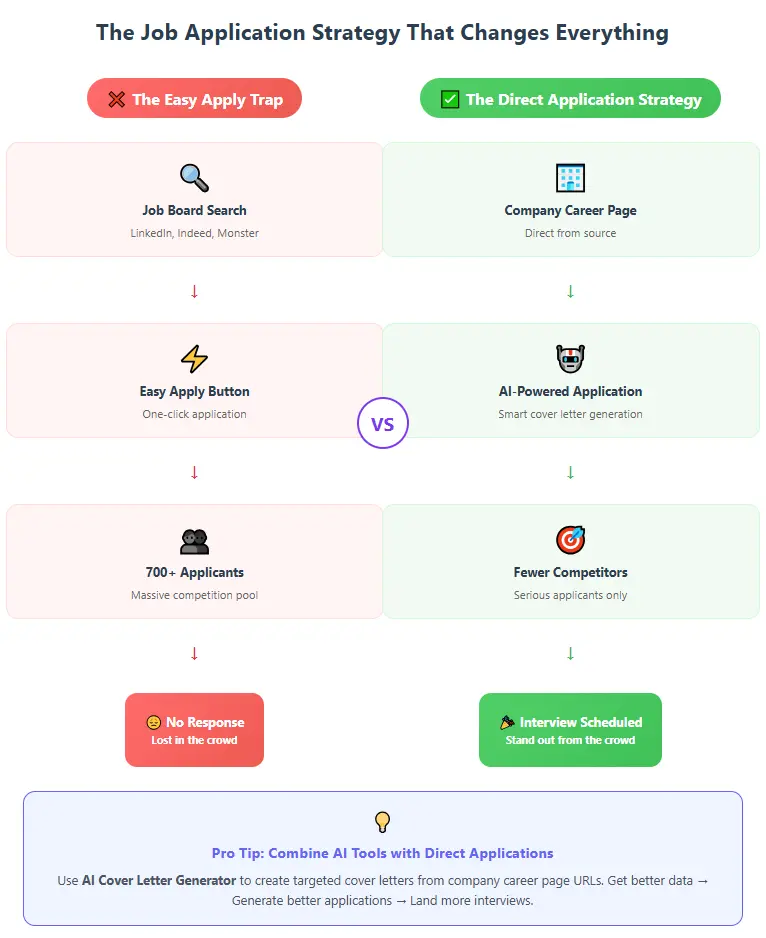Best AI for Writing Cover Letters: Why Your Job Source Strategy Matters More Than the Tool
Discover why the source of your job postings matters more than which AI tool you use - and how this simple strategy can dramatically increase your interview rates while most applicants get lost in Easy Apply crowds.

Here's something that might surprise you: the biggest factor in getting interviews with AI-generated cover letters isn't which AI tool you use - it's where you find the job postings.
This realization came from a painful lesson I learned years ago when job hunting. I applied to over 200 positions using Easy Apply and similar quick-application features. The result? Not a single interview. Not even a rejection email from most companies. Let me share what I learned and how AI tools change the game when used correctly.
The AI Cover Letter Tools That Actually Work
Before we dive into the real secret, let's address what you came here for - which AI tools are worth your time:
ChatGPT with good prompts remains the most flexible option. You control exactly what it focuses on, but you need to know how to write effective prompts. Specialized tools like https://ai-coverletter-generator.com/ are purpose-built for this exact task. They understand resume formatting, job requirements, and can analyze job postings directly from URLs when you upgrade to premium. Generic AI writing tools (Jasper, Copy.ai) can work, but they're designed for marketing copy, not job applications. You'll spend more time editing. The honest truth? Any decent AI tool can write a solid cover letter if you give it the right information. The problem is most people are feeding their AI garbage data.The Job Application Strategy Nobody Talks About
Here's what I learned the hard way: Easy Apply is making your life harder.
The "Easy Apply" Trap
You know those one-click application buttons on LinkedIn, Indeed, and other job boards? They seem like a time-saver, but they're actually sabotaging your chances.
Think about it: if it takes you one click to apply, it takes everyone else one click too. As one Reddit user put it perfectly: "Easy Apply isn't good for much of anything other than getting lost in a pile of applicants. When it's that easy to apply, there's going to be that many more applicants to compete with."
Just to test this theory, I randomly searched for "entry level data analyst" on a popular job platform with Easy Apply 4 days ago. One posting already had over 700 applicants. Seven hundred people, for a single entry-level position, in just 4 days.
 Real screenshot: 728 applicants for a single entry-level position in just 4 days - this is why Easy Apply hurts your chances
Real screenshot: 728 applicants for a single entry-level position in just 4 days - this is why Easy Apply hurts your chances
That's the reality of Easy Apply - you're not just competing against qualified candidates, you're drowning in a sea of one-click applications.
Why Direct Applications Win
1. You're Competing Against Fewer PeopleWhen applications are easy, everyone applies - even people who are barely qualified. When you have to visit the company website, read their values, and submit through their system, most lazy applicants give up. You're suddenly competing against a much smaller, more serious pool.
2. You Signal Genuine InterestTaking time to find and apply through the company's career page sends a message: "I specifically want to work HERE, not just anywhere." Recruiters notice this. It shows you're someone who does research and puts effort into getting things right.
3. Companies Save Money on YouHere's something most job seekers don't know: companies pay recruiting fees when they hire through job platforms or agencies. When you apply directly, they save that commission (often 15-25% of your first-year salary). This makes you a more attractive candidate financially.
4. You Get Better InformationCompany career pages often have more complete job descriptions, company culture information, and direct contact details. Job boards strip out a lot of this context, leaving your AI tool with less information to work with.
The Winning Combination: Quality AI + Direct Applications
Once I started sourcing jobs directly from company websites and feeding that complete information to AI tools, the difference was dramatic. Instead of getting lost in hundreds of Easy Apply submissions, I started getting responses and interviews.
 The strategic difference: Easy Apply creates massive competition, while direct applications put you in a smaller, more serious applicant pool
The strategic difference: Easy Apply creates massive competition, while direct applications put you in a smaller, more serious applicant pool
Here's my exact process:
Step 1: Find Jobs the Right Way
- Start with the company's career page, not job boards
- Use Google: "company name careers" + your role
- Check company LinkedIn pages for direct postings
- Look for roles posted by actual hiring managers
Step 2: Use AI Tools Effectively
You can try crafting your own prompts for ChatGPT, but honestly, it takes a lot of trial and error to get consistently good results. You need to figure out the right way to structure your resume data, how to present job requirements, what tone to request, and how to avoid generic outputs.
That's why I switched to https://ai-coverletter-generator.com/. It's specifically designed for this task, so it already knows how to analyze resumes and job postings effectively. The premium version can even pull job details directly from company URLs, which saves tons of time and ensures you're not missing important context that gets lost when copying and pasting.
Step 3: Quality Check Your Output
Good AI cover letters mention:- Specific job requirements from the posting
- Company values or mission (when available)
- Your relevant experience matched to their needs
- Why you want to work for THAT company specifically
What This Actually Looks Like
Before (Easy Apply + Generic AI): "I am writing to express my interest in the Marketing Manager position. With my 5 years of experience in marketing, I believe I would be a valuable addition to your team..." After (Direct Application + Targeted AI): "Your recent expansion into sustainable packaging solutions aligns perfectly with my passion for environmental marketing. In my current role at GreenTech, I've led similar product launches that increased market share by 23%..."The difference? The second version could only be written by someone who actually read the company's job posting and recent news.
Your Next Steps
- Stop using Easy Apply - seriously, just stop
- Find 5 jobs directly on company career pages this week
- Use any quality AI tool with the complete job posting information
- Track your results - you'll see the difference within two weeks
The best AI for writing cover letters is the one you use with better source material. Focus less on finding the perfect tool and more on finding the right opportunities through the right channels.
Tools That Make This Easier
If you're applying to multiple positions weekly, consider tools that can streamline this process:
- https://ai-coverletter-generator.com/ for URL-based job analysis (premium feature)
- Google Alerts for new job postings from target companies
- Company newsletter subscriptions for insider information on growth and hiring
The goal isn't to work harder - it's to work smarter by focusing your AI-powered applications where they'll have the biggest impact.
Ready to test this approach? Pick three companies you actually want to work for, find their career pages, and apply directly using AI-generated cover letters. You'll see why this strategy beats shotgun applications every time.